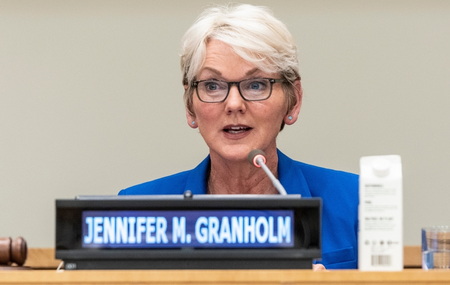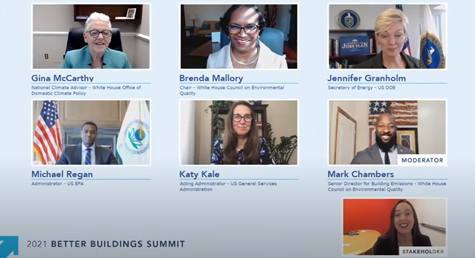
U.S. Energy Secretary Jennifer Granholm, above, announced on Nov. 3 a “soft launch” of the multi-sector Better Climate Challenge at the COP26 international conference in Glasgow. This new Department of Energy (DOE) effort aims to recognize U.S. real estate, industrial, and other companies that voluntarily agree to slash their GHG emissions – and share their “best practices” toward achieving emissions reduction goals. (Climate Challenge Factsheet | FAQs | Informational webinar)
Program Requirements
- The key element of DOE’s voluntary challenge is for companies to commit to reduce direct emissions (“scope 1”), and emissions from electricity purchases (“scope 2”), by 50% over 10 years. There is no requirement to quantify or reduce indirect “scope 3” emissions.
- The 10-year window is measured from a baseline of up to five years before a company joins the program.
- Commitments to reduce emissions must be across a building portfolio.
- Participating companies must also pursue an efficiency target, to prioritize energy savings that will contribute toward the 50% reduction in portfolio-wide emissions over a decade.
- Companies joining the program must pledge to share energy and emissions data for 10 years through EPA’s Portfolio Manager, publicly report on progress, participate in peer-to-peer exchanges, and help develop industry best practices.
Corporate Purchases of Clean Power
- DOE staff discussed the new program yesterday with The Roundtable’s Sustainability Policy Advisory Committee (SPAC).
- DOE explained that to reach the 50% emissions reduction target, companies can tally their long-term clean power purchase agreements (PPA) and associated renewable energy certificates (RECs). PPAs and RECs are increasingly common strategies used by CRE and other sectors to help deliver more renewable energy to the electricity grid.
- Staff further explained that it does not intend for certain carbon “offsets” (such as planting trees offsite) to count towards meeting the 50% emissions reduction target.
Partnership Agreements and Public Recognition
- Companies that pledge to participate in the Better Climate Challenge must sign a partnership agreement with DOE.
- DOE will work with organizations as they develop organization-wide GHG emissions reduction plans and provide technical assistance with meeting corporate goals.
- DOE aims for the Challenge to develop and provide “alternative pathways” that present options for companies to set and achieve climate targets.
- Organizations that have already made similar commitments are encouraged to reach out to DOE to discuss how they can participate. For example, DOE will accept pre-established corporate goals with an approved 1.5° Celsius aligned science-based target, on a case-by-case basis.
- Aside from Wednesday’s “soft launch,” DOE plans further public recognition for participating companies during a formal launch slated for early 2022. DOE also intends to feature companies that participate in the Challenge at its next annual Better Buildings Summit in Washington, D.C. on May 17-19, 2022.
- So far, 32 organizations have publicly pledged their commitment to the Better Climate Challenge as DOE elevates outreach out to private sector companies, states, municipalities and other organizations.
Contact the Department of Energy to Participate

- Those interested in participating and considering a “partnership agreement” should contact DOE:
- References:
- Climate Challenge Factsheet | FAQs | Informational webinarBetter Climate Challenge Partnership Agreement
- Better Climate Challenge Partnership Agreement for Energy Intensive Industries
- Better Climate Challenge Partnership Agreement for Multifamily (coming soon)
# # #






















